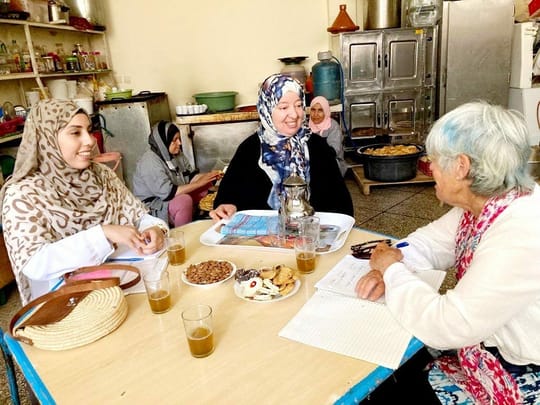By Ellen Hernandez, HAF Writer/Editor

Imagine Empowerment Workshop
Photo: HAF Imagine Trainers
24 January 2022—On this International Day of Education, we recognize that education is a human right. We reflect on the role of schooling in all communities of the world, not just in the most developed countries and not just in the most affluent cities, but in the remotest corners of the globe, beyond New York, London, Rabat, or Casablanca. What, we ask ourselves, is the impact on a young person’s life of cutting short their formal education?
Too often, this reality occurs for reasons outside of their control: family obligations, inadequate finances, lack of access, environmental challenges, or traditional expectations. Some places in the world do not have the infrastructure to provide higher levels of schooling to all of the nation’s youth, and Morocco is no exception. In a remote mountain village, building a school for adolescents to continue their education is not as high a priority as building a well or an irrigation system to expand crop yield.
Yet, we know that education can be an essential tool for rising out of poverty, for having opportunity and expanding choices, or simply for the chance to start a small business and earn a simple living that makes one feel greater pride, fulfillment, and satisfaction.
High Atlas Foundation (HAF) works with Moroccan communities to engage in participatory sustainable development initiatives for the improvement of livelihoods. This always begins by facilitating inclusive community dialogues to ascertain the people’s desires and needs. Only then can we know how we can be of assistance. Inevitably, participants will cite increased means of income as a priority, and often, this entails new business ventures. This might take the form of community nurseries built on land lent in-kind by government or civic entities in order to grow organic fruit trees that will be made available to farming families at highly reduced prices. It might manifest as a filtration system for access to clean water. It can involve planting trees with children at schools or with youth at Child Protection Centers so they learn to take care of the plants and gain environmental awareness.
Sometimes, though, it is shaped by the voices of those who want to expand their choices and opportunities and feel that sense of fulfillment and self-satisfaction. HAF has several certified trainers on its staff who facilitate “Imagine” empowerment workshops. These are four-day, 32-hour, rights-based experiences for community groups of women and youth to learn about and discuss information in seven areas, including emotions, relationships, and health, among others. Participants learn about their rights and learn to respect themselves and see themselves as capable. They follow this with opportunities for technical and entrepreneurial training from the USAID Farmer to Farmer program and form cooperatives to manage businesses and earn their own income, some for the first time in their lives.
HAF also engages community members in literacy (and numeracy) instruction. In these cases, people who did not have unlimited access to continued schooling have an opportunity to learn reading, writing, and mathematics skills for better functioning within cooperatives, associations, managed businesses, or just for personal fulfillment as informed people with a voice, a say over their future. With support from the European Union, HAF is now able to hire educated Moroccan women to be trained as literacy instructors by local university students in their region in order to teach the women of these communities, women who have expressed during their Imagine workshops the desire to increase their capacities. Furthermore, the youngest children of these communities will attend classes with their mothers and in this way develop skills they would not normally have access to for lack of pre-primary schools in remote places. The whole of the program is intended to promote family literacy within their households and throughout their communities toward the national goal of eradicating illiteracy in Morocco this decade.
As we recognize and celebrate worldwide educational achievements large and small, we acknowledge that job creation, economic development, and building human capital must include education as a key component.

Women in Laayoun Charkia (Taounate Province), Imagine Empowerment Workshop
Photo: HAF Imagine Trainers
This publication was produced with the financial support of the European Union. Its contents are the sole responsibility of the High Atlas Foundation and do not necessarily reflect the views of the European Union.

